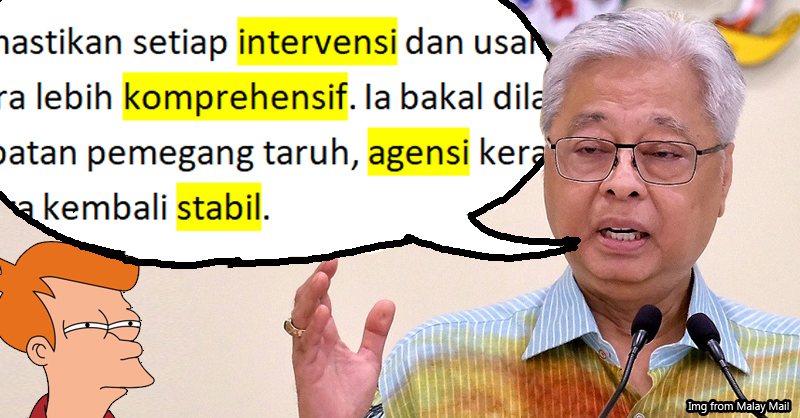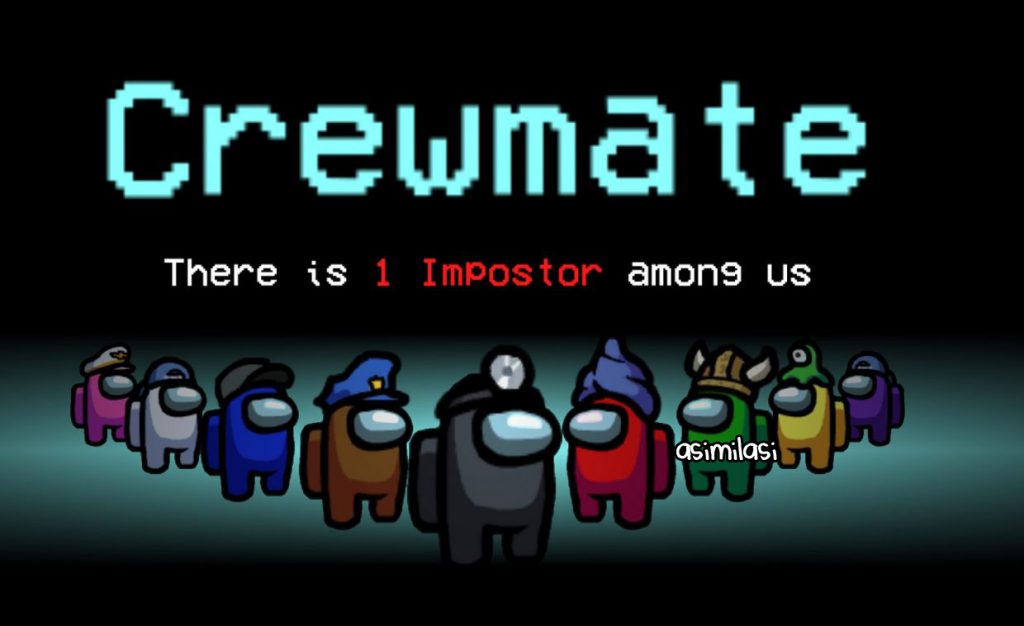Ismail Sabri wants companies to use more Bahasa… so we checked his BM

- 769Shares
- Facebook721
- Twitter5
- LinkedIn5
- Email5
- WhatsApp33
Recently, our glorious leader Datuk Seri Ismail Sabri Yaakob had reprimanded government agencies, government-linked companies (GLCs), and private companies for giving English (the language) more priority than Bahasa Melayu in their day to day operations. He also highlighted a trend where company names, housing projects, and product brands chose to not use Bahasa Melayu.
“I hope that every conference, meeting and others must use Bahasa Melayu after this. Who else can lift up Bahasa Melayu but us,” – Ismail Sabri, obviously translated by us, from Harian Metro.
Speaking at an international Bahasa Melayu debate competition in UTM, Ismail Sabri declared that we want to make Bahasa Melayu great again, by making it a medium of knowledge and an international language for the 21st century. He further states at Bahasa Melayu is one of the only 20 languages that had been recognized as an official language worldwide, and that Bahasa Melayu (or rather Bahasa Melayu-Indonesia) is among the top 10 most used languages (online).
Interesting. We wondered whether Ismail Sabri is really practicing what he’s preaching, so…
We combed his speech for disguised English terms

Original img from Unpause Asia.
In case you’re wondering, yes, we’re being petty about this whole thing. One of the gripes we’ve heard about Bahasa Melayu over the years is the abundance of assimilated words, particularly from English. You know, like using ‘normalisasi‘ as the Bahasa version of ‘normalization‘, ‘bakteria’ for ‘bacteria’, and so on.
So with the free time we had, we went through Ismail Sabri’s inaugural speech as Prime Minister and listed out all the English words poorly disguising themselves as Bahasa. Altogether, we found 34 of them:

But do these words have proper Malay equivalents? To find out, we ran this list by the Dewan Bahasa and Pustaka’s online dictionary to see if these words are legit or not. Of this 34 terms, 7 of them seem to be very stretched:

*Frontliners and inklusif are not listed as entries. Should be are available alternatives.
13 of them seem to be proper Malay terms, but have less-angmoh equivalents:

And 14 of them have no proper Malay terms to replace them, but are found in the dictionary.

So even someone who’s advocating more Bahasa Melayu can’t avoid using borrowed English terms entirely. Which might make you wonder…
Why haven’t the DBP came up with proper Malay words for these?

Some of the newer terms DBP had came up with. See the whole list here.
Based on our previous experience with Malay words like tunafoto (photobombing) and tular (viral), we know that the Dewan Bahasa and Pustaka is able to come up with and introduce new Malay terms to the public. So why haven’t they come up with more Malay words to replace the 14 words above?
Well, according to the DBP, assimilation of words – which is when you adopt foreign words with or without adjustments to the spelling and pronunciation – is also a valid way to expand Bahasa Melayu’s vocabulary. A DBP answer states that assimilation is preferable to coming up with new terms, provided that the assimilated term:
- makes it easier to exchange information.
- makes understanding foreign texts easier.
- will be much simpler than its possible Malay translation.
- will make it easier for experts to agree on what they’re referring to if the Malay translation has too many synonyms.
Which term gets assimilated also depends on what the general public is more comfortable with as well. Sometimes we do have Malay terms for certain concepts, but over time the assimilated English terms got used more, so it became the norm. Examples for this would be haiwan karnivor (previously haiwan maging), hibernasi (previously tidor-tapa), and endosperma (previously bekalembaga).

Finding your center before winter. Img from Pinterest.
Other times, existing Malay terms are either too wide or too narrow to properly explain a concept, so a familiar foreign term is used. An example is bakteria (previously kuman). Kuman had a negative connotation, associated with diseases, but bakteria also covers good microorganisms, like those used in fermentation. There’s more to this topic than we can cover in this short article, but the takeaway here is that assimilation is inevitable, as language evolves over time.
Still, with assimilation happening willy-nilly in today’s Bahasa Melayu, one might wonder…
What kind of Bahasa are we trying to enforce?

Yes daddy. Img from Nerd Fitness.
Following Ismail Sabri’s statement, already some association had crawled out of the woodwork and called for the government to enforce the use of Bahasa Melayu more strictly.
“The Language Audit carried out by Dewan Bahasa dan Pustaka (DBP) before does not seem to be effective because it is not followed up with appropriate action, this is because no party is authorized to take punitive action against those who ignore the instructions. The results of the language audit monitoring should be followed by action so that the effort is not wasted,” – Dr Mohamad Saleeh Rahamad, president of PENA, to NST.
But we have to ask though: what kind of Bahasa Melayu are we trying to enforce? We’re aware that a big part of Bahasa Melayu is assimilation. From the time it first appeared, Bahasa Melayu had picked up vocabulary and grammar rules from every penjajah, trader, and culture it came in contact with, and that’s part of what makes the language so special.
But it seems that in recent years, there’s a bit too much lazy assimilation of English terms, and it’s a cause for worry. As pointed out by Dr Rais Yatim, then the Prime Minister’s Social and Cultural Advisor, this might eventually cause Bahasa Melayu to lose all of its Melayu-ness.
“I call for there to be deeper research (in translating English terms) so that (Bahasa Melayu) won’t be seen as a language that depends on plagiarizing terms that we mostly have in our own language,” – Dr Rais Yatim, translated from Astro Awani, 2016.
On one hand, there’s nothing wrong with asking more people to speak the national language, and to insist on using it for official purposes. On the other hand, we feel that there’s no point in going all gung-ho and terpaling Melayu with enforcing the language if you can just sprinkle in words like inklusif and intervensi and call it a day.
[In the spirit of inclusiveness, we’ve sent this over to our friends at Soscili to see if they want to translate this article to Bahasa Melayu.]
- 769Shares
- Facebook721
- Twitter5
- LinkedIn5
- Email5
- WhatsApp33
